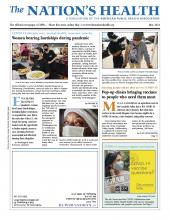
Scientists have access to troves of health data through the All of Us Research Workbench, which recently added genetic data.
Photo by AnnaStills, courtesy iStockphoto
From maternal mortality and nutrition, to sleep quality and COVID-19 respiratory illnesses, researchers across the U.S. are using data from the All of Us Research Program to drive new science on a range of health issues.
Now in its third year, the All of Us program is offering health data on hundreds of thousands of Americans to researchers for use in their work. Through the program’s online Research Hub — which hosts one of the largest, most diverse health datasets ever assembled — users can explore aggregate data on physical measurements, electronic health record information, wearables data and more. Scientists can register for the program’s Researcher Workbench for greater access to the data.
The workbench started a year ago for beta testing. This year, new data will include genetics and troves of additional information on social determinants.
“More than 200 academic institutions, nonprofits and health care organizations across the U.S. have signed our data use agreement so their researchers could access All of Us participant data,” Sheri Schully, PhD, acting chief medical and scientific officer of the program, said in mid-March. “And that number is growing each week.”
Launched in May 2018 by the National Institutes of Health, the All of Us Research Program is calling on Americans to voluntarily share their health data to advance science. APHA is a partner in the program, helping to share information about the project and recruit participants.
As of mid-March, the program included almost 375,000 people. Participants share information in a variety of ways, including surveys, electronic health records and biosamples. Data is stripped of personal identifiers and made available for research.
The program’s ultimate goal is to improve health outcomes and ways of preventing and treating chronic illnesses and diseases for millions of people. All of Us embraces precision medicine, which aims to treat individuals based on their unique diversity and medical history. It uses advances in genomics, state-of-the-art methods to manage and analyze large datasets, and health information technology to improve biomedical discoveries for all people.
About 80% of participants who have completed signup are from groups underrepresented in medical research, Schully told The Nation’s Health. Racial and ethnic minorities, older adults, people with disabilities, women, and residents in urban and rural counties are part of the diverse demographics.

The All of Us Research Program collects biosamples from its growing diversified cohort.
Photo courtesy All of Us
The data collected can help scientists tackle health disparities, spurring research in prevention that is customized and tailored to people in different communities, based on race, ethnicity or other demographic information. A diverse cohort will enable researchers to explore, for example, why Blacks in the U.S. have a higher mortality rate than whites from heart disease, Type 2 diabetes and hypertension. It could also offer insights into why Hepatitis B is more common among Asian Americans and Pacific Islanders.
With genetic data becoming available this year, researchers will be able to perform in-depth genetic analyses that include both whole genome sequencing and genotyping, Schully said. Determining how genetics affect chronic illnesses for diverse groups is among the possibilities. Genetic results will be available to participants so they can learn more about themselves.
In addition, public health researchers involved in social determinants of health will have a growing treasure to explore.
“Over the next year, we will actually be expanding our social determinants of health data, which I think is super exciting from a public health perspective,” Schully said.
And though COVID-19 slowed participation among volunteers, All of Us data on people who had COVID-19 have brought in information that can be used to learn more about its health and social impact.
As part of APHA’s continued partnership with the All of Us program, APHA will host a webinar and workshops in May and June to help researchers access and use program data.
To learn more about the All of Us Researcher Workbench, visit www.researchallofus.org. For more about APHA’s involvement with the All of Us program, visit bit.ly/allofusnh.
- Copyright The Nation’s Health, American Public Health Association









